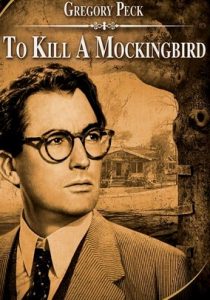To Kill a Mockingbird-1962
Director Robert Mulligan
Starring Gregory Peck, Mary Badham, Robert Duvall
Scott’s Review #468
Reviewed August 25, 2016
Grade: A
To Kill a Mockingbird is a 1962 film based on Harper Lee’s renowned novel. It was released only two years earlier, in 1960.
The novel was groundbreaking, and the film is equally so. Race and racism are front and center in the storyline. The film is still a marvel because it tells the story through the eyes of a child—in present-day terms, an adult—as she reflects on her experience.
The film is set in the 1930s in a small Alabama town.
We follow the lives of Atticus Finch, a respected lawyer and father, and his two young children- Scout and Jem.
Gregory Peck, as Atticus, is the moral center of the film. Scout (Mary Badham) narrates, and her innocence makes the story much more compelling and less like a preachy vehicle for a social topic.
The Finchs are a tight family unit as Atticus is widowed, leaving Jem and Scout motherless. A poor black man-Tom- is accused of raping and beating a white woman, also poor, coached into the accusations by her racist father.
We accept that the woman had designs on Tom and, when caught by her horrified father, was beaten, with Tom left to take the blame.
Much of the film, but not too much, takes place in the courtroom, as we hear testimony by the poor woman, her father, and Tom.
Not to be missed is that every juror is a white man- a sad reminder of the racism that existed and one argues still exists, though not as blatant in today’s modern world.
One cringe when the black attendees are forced to sit in the upper portion of the courthouse, an obvious way to demean and lessen them, and which speaks volumes for the town- we realize Tom does not have a chance, yet we hope against hope for his acquittal.
Wisely, I do not feel the point is the trial’s outcome—we know what will result. But the film teaches us a lesson about reality: life is often unfair and painful.
The after-effects of the trial are the most exciting part of To Kill a Mockingbird.
Gregory Peck was awarded the Best Actor Oscar in 1962 for his role as a liberal, progressive, and honorable man who can do no wrong and is an excellent example for his children.
A black maid, Calpurnia, works for him, and he treats her like family. I could not help but think she is the mother figure in Jem and Scout’s lives.
Atticus does the right thing, treating everyone fairly and living a moral life. He is an excellent example, and it is no wonder Peck won the trophy.
A subplot involves a mysterious neighbor, Boo Radley, feared by the town kids but turning out to be a protector and companion to Scout and Jem. This role was the first for acclaimed actor Robert Duvall- the actor has a tiny yet important role and does a great deal of expressive acting without uttering a line.
The title of the film is poignant and essential to the ending.
The film is really about Jem and Scout and their quick journey into the pains and unfairness endured by adults- once innocently enjoying the summer, playing games, and making friends with a visiting young boy, they are exposed to evil and a hate-filled racist town, which they slowly come to realize exists.
Filmed in black and white, this quality enhances the picture. The blowing leaves and dark shadows add much to the impressive cinematography and give the film a dark quality that color would have ruined.
The 1930s time period is very authentic.
To Kill a Mockingbird is a timeless film with an important message about the world. Children and adults of every generation should view it as a lesson in empathy and compassion.
The film is not ugly or raw but is truthful and still feels fresh. It will resonate with all audiences patient enough to give it a good watch.
Oscar Nominations: 3 wins-Best Picture, Best Director-Robert Mulligan, Best Actor-Gregory Peck (won), Best Supporting Actress-Mary Badham, Best Screenplay Based on Material from Another Medium (won), Best Music Score-Substantially Original, Best Art Direction, Black-and-White (won), Best Cinematography, Black-and-White
